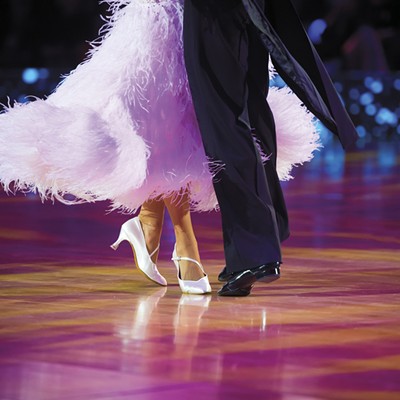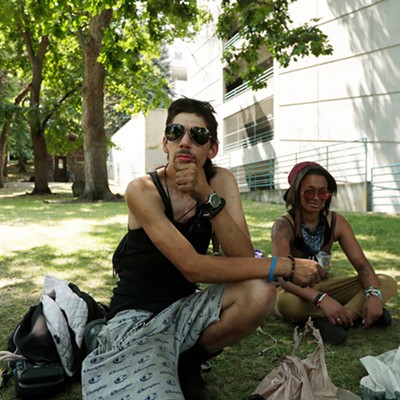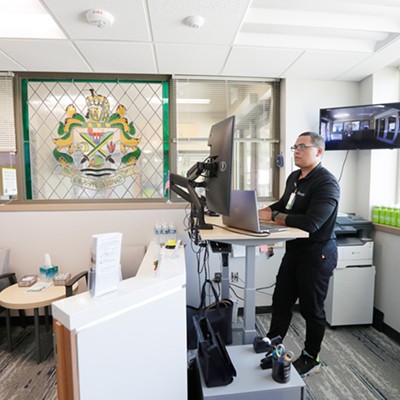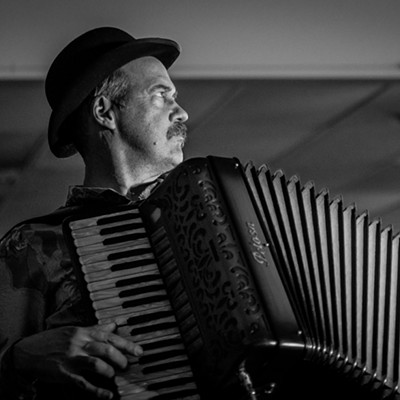
It's tax weekend in America — and one group of Washingtonians is especially unhappy about it.
"Taxation is Theft!" reads the flag flying above the Woman's Club of Spokane, where about three dozen liberty-minded people from across the state have gathered for the Libertarian Party of Washington's annual convention.
The party has about 180 dues-paying members statewide. As Libertarians, they seek a "world in which all individuals are sovereign over their own lives and not forced to sacrifice their values for the benefit of others," the party platform says.
Inside the Woman's Club, members of the party are listening to six of the 30 Libertarians running for president this year as they debate issues like immigration, foreign wars and abolishing various federal agencies. Two candidates — Chase Oliver and Jacob Hornberger — are on stage in person, and the rest are appearing by videoconference.
"The federal government carpet-bombs us as citizens, and the local government holds a gun to your head," Lars Mapstead, a tech entrepreneur from California who is running for president, tells the crowd.
With about 700,000 registered voters in the 31 states that report Libertarian registration statistics, the Libertarian Party might be the third-biggest political party in the country, but it doesn't change the fact that America runs on a two-party system. There are tens of millions of Democrats and Republicans, and the odds of any of this year's Libertarian candidates becoming president are astronomically low.
An audience member named Miguel Duque acknowledges as much in a blunt question posed to the candidates at the end of the town hall.
"None of you are going to be president," Duque says. "Every four years, Libertarians spend time attending meetings, Zoom calls, listening to podcasts where you ask them for money. And you end up getting very, very few votes, and often very little attention for that matter."
Duque goes on to ask the candidates what they would do if the party's delegates chose to nominate "none of the above" at this year's national convention.
The question is met with awkward laughter. The moderator apologizes to the candidates, and says they can ignore it.
Oliver chooses to respond, arguing that a well-run presidential campaign can still help build up the party and increase national attention.
"You're right, the chances of winning the presidency is an uphill climb, but do I believe it's impossible? Absolutely not," Oliver says. "What is totally possible is having more membership, more ballot access, more major party status and growing our party foundation up."
After the town hall, Oliver goes outside, where he smokes a joint and chats with other convention attendees. The lapel pin on his suit is a logo for the party: a torch with a flame that looks like an eagle.
Oliver's campaign has raised $68,284 in individual contributions — more than double any of the other Libertarian candidates this year. In 2022, Rolling Stone described him as the "most influential Libertarian" of the year when he ran for a Senate seat in Georgia against Republican challenger Herschel Walker and Democratic incumbent Raphael Warnock. He got 2% of the vote — possibly acting as a spoiler candidate and forcing the race into a runoff.
One of the most common arguments people make against voting third party is that it's effectively throwing away your vote. A Democrat or Republican is all but guaranteed to win. If you dislike both, why not just vote for the lesser of two evils?
Oliver disagrees.
"If you're voting for someone that you don't truly believe in, you're throwing your vote away," Oliver says. "We get this accusation that we are spoilers, that we're somehow spoiling the election for you. The truth is, Libertarians and Libertarian candidates are just participating in the system that we have."
'LIBERTY IS EVERYTHING'
The Libertarian Party occupies an odd place in American politics.The party was formed in 1971. Members promote a strong view of individual rights and a significantly reduced federal government.
"We just don't want to control what other people are doing," says Sydney Wissel, a member of the Washington branch of the party.
The party has historically promoted gun rights, ending the war on drugs, same-sex marriage, lowering taxes, ending capital punishment and eliminating the welfare state in favor of private charities.
"We're very different from the Republicans," Wissel says. "I mean, Republicans are usually more open to talking to me than Democrats, but they're really different. They really seem suspicious of us, about the drugs, about the openness to having no government at all that a lot of us feel."
Miguel Duque, the convention attendee who asked the presidential candidates about the fact that they aren't going to win, says he started becoming interested in libertarian philosophy in college, during Ron Paul's 2012 presidential campaign.
"He just threw me for a loop, because he was running as a Republican, but he was espousing all these libertarian ideas that I thought were unlike any of the Republican views," Duque says.
Duque joined the party shortly after. It's where he met his wife, Anna Duque, who was elected as chair of the state party in 2021 and stepped down during this year's convention to take care of their new child.
"A big aspect of what brought me to the Libertarian Party is basically just to meet like-minded people," Miguel Duque says. "We have a lot of fun."
The party's three-day convention in Spokane featured a lot of bureaucratic debates over changes to bylaws and other business. But it also had indoor laser shooting, a magician, karaoke, a brief burlesque show and kegs of "liberty light beer."
One table displayed products from Bodhi High, a local cannabis brand. Another table featured gun accessories and used military helmets. Many attendees were openly carrying handguns. Three wore cowboy hats, and one wore a kilt.
A massive banner that said "FREE ASSANGE" and "Journalism is not a crime" hung at the entrance to the convention space, a reference to Julian Assange, the WikiLeaks founder the U.S. government has attempted to prosecute for leaking classified documents.
A Libertarian version of the "In this house we believe" yard signs with rainbow text hung on the wall next to the military equipment, declaring that "The news is propaganda / The state is organized crime / Taxation is theft / Socialism is the gospel of envy / All gun laws are an infringement / Liberty is everything."
(While the party invited almost all major media outlets in Spokane to the convention, the Inlander was the only one that showed up.)
Anna Duque, the former party chair, says she sometimes hears the stereotype that libertarianism is male-dominated — just a bunch of "fedora-wearing dudes in their basements." But it's not accurate, she says.
"There's a lot of different types of people involved in the Libertarian Party," Anna says. "We're human beings, and human beings have a variety of interests and needs and desires and motivations."
Indeed, the ratio of women to men at the Washington chapter's weekend convention appeared close to equal. One of the weekend's featured speakers was Bess Byers, a digital marketing specialist for Reason, a Libertarian magazine, who gave a talk about the challenges of making libertarianism more inviting to women.

LOCAL RACES
The Libertarian Party of Washington's membership has decreased in recent years. The total number is about 180 now, down from closer to 400 in 2020, Anna Duque says."Membership is kind of low right now, but it tends to bottom out, and I'm assuming it's going to go back up pretty soon," she says. "It tends to go in cycles, it drops down to its lowest right before presidential season."
She says she thinks voter dissatisfaction with the current Democratic and Republican nominees will help prompt new members to join later this year. Miguel Duque also thinks more young people are starting to become interested.
"Libertarianism is kind of fringe, but with the world so crazy, people are open to hearing something new," Miguel Duque says.
He also notes that the total number of people with libertarian beliefs in Washington is far higher than the number of official party members. In 2016, for instance, 160,879 Washingtonians voted for Libertarian presidential candidate Gary Johnson.
During its weekend convention, the party voted among its members to elect 13 delegates who will travel to Washington, D.C., in May for the party's national convention and choose the party's nominee for the 2024 presidential race.
Unlike the Republicans and Democrats, Libertarian candidates don't appear on Washington's presidential primary ballots. That's partially because the Libertarian Party of Washington is classified as a "minor party." To get "major party" status, the Libertarian Party would need to get more than 5% of the vote in a statewide race.
The party achieved major party status in 2000, when candidates in several statewide races crossed the 5% threshold. The party lost that status the next year, then later came tantalizingly close in 2016, when Johnson came in at 4.9%.
But the movement's biggest hurdle isn't necessarily party status, Miguel Duque says, it's "more a cultural battle" to overcome the dominance of the two major parties and pro-government sentiments.
"It's a duopoly," he says. "Even in a place like Washington, where we do have marginal fringe groups, they're still a small, small minority."
Colin Morgan, the newly elected chair of the Washington Libertarian Party, doesn't think a Libertarian president coming in and changing the entire federal government is likely in the near future. He thinks one of the party's main long-term goals should instead be to build self-reliance — a "parallel community, parallel economy," that can push back against government overreach.
"We need to basically get out from under the system, because it's not going to get better, it's going to get worse," Morgan says.
But that doesn't mean politics doesn't matter, Morgan says.
"You've got to do the regular political thing. You've got to build up the base, you've got to have a foundation, you've got to start working on local candidates, start winning a bunch of those elections and move up to [the] state level," Morgan says.
Miguel Duque, who previously served as political director of the Washington branch of the party, says the party has increasingly turned its attention toward city councils and smaller, often overlooked seats where Libertarians can more feasibly win.
The Libertarian Party's website lists 329 Libertarians who hold elected office across the country. Four currently hold office in Washington state: two are city council members in Covington and Moses Lake, while the other two are fire commissioners in Snohomish County and Lacey.
The list hasn't yet been updated to include Wissel, who was elected as a commissioner for the Moran Cemetery District just south of the city of Spokane in November last year.
Washington state has a number of public cemetery districts that elect commissioners and collect taxes to pay for upkeep. Wissel says she's still learning what the job fully entails but that she thinks the cemetery district needs to be more responsible with taxpayer money.
"We're basically tasked with making sure the place is maintained, but I think there needs to be more along the lines of how to make some money off it," Wissel says.
When asked what they wish people understood about libertarianism, the convention-goers all have similar answers. Being a Libertarian "doesn't mean that we don't care about other people," Wissel says.
Anna Duque agrees.
"That couldn't be further from the truth," Anna Duque says. "For me, the Libertarian philosophy is based on compassion. We cannot stand to see people forced by others into anything — into living their lives in a way that other people want them to live." ♦
























